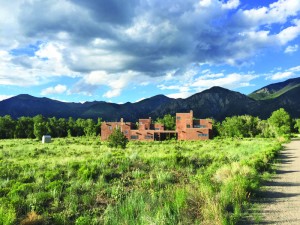The week after the Class of 2015 graduated, eight faculty members gathered for a two-day workshop in Cossitt Hall. The list of departments represented by this group of professors was eclectic: kinesiology, education, history, environmental studies, religion, math and computer science, business and economics, and German.
But they all came to learn about one thing: sustainability. Or more specifically, how to incorporate the college’s Sustainability Learning Objectives, as defined by recommendations from the Strategic Knowledge Development process established in 2013-14, into their courses.

This August, approximately 40 CC first-year student-athletes will head to the Baca Campus during their New Student Orientation trip to install solar panels. A solar contractor will dig trenches, place racks and lay wiring for the ground-mounted system, and then train the students to install the panels. The result? In a few days, the Baca Campus will produce as much energy as it uses.
Ian Johnson, campus sustainability director, couldn’t have been more thrilled about the range in the room — something he’d also seen during the previous year’s inaugural workshop. Having run these types of programs at his previous job at the University of Wisconsin, he became used to something very different.
“What my experience was, you get a few people who are kind of the usual suspects … and they realize the breadth of it and they start to bring in a couple of colleagues here and there and it grows over time. Here it’s totally different, which is testament to really just the way everything is, [including] the developmental level of understanding, particularly in the liberal arts context, how everything impacts everything.”
During the workshop, some of the faculty members had a pretty good idea of how to integrate sustainability: Visiting Assistant Professor of Mathematics and Computer Science Michael Penn, for instance, teaches Calculus 101. For his students, he’ll write classroom examples and homework questions using sustainability-based data sets.
“When you’re dealing with something as cut and dried as calculus, and 101, that’s the way you fit it in,” Penn said.
For others, trying to find ways to weave sustainable themes in organically was more of a challenge. Purvi Mehta, assistant professor of history who teaches the history of Southern Asia, questioned how to teach a topic when its definition is based in present and future needs. Johnson suggested she dig into historical phenomena and patterns that informed today’s sustainability issues, giving her students a way to examine the past and hopefully allow interpretation for the future.
When it comes down to it, the learning objectives are about building a coherent literacy around sustainability for students. And it means a shift.
“Like diversity/inclusivity,” commented one participant, “it’s a philosophical approach to pedagogy.”
The Bulletin‘s Role
Sustainability is a campus-wide effort. Even CC’s print materials, like the one you hold in your hands right now, play a role. The Bulletin is a part of innovative paper production and harvesting programs, including FSC (the Forest Stewardship Council), and PrintReleaf, a program that helps reduce the environmental impact of using forest products by tracking consumption and planting trees across a global network.